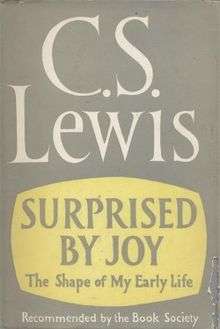Surprised by Joy
 First edition (UK) | |
| Author | C. S. Lewis |
|---|---|
| Country | United Kingdom |
| Language | English |
| Genre | Autobiography |
| Publisher |
Geoffrey Bles (UK) Harcourt Brace (US) |
Publication date | 1955 |
| Media type | Paperback |
| Pages | 252 |
| OCLC | 28289338 |
Surprised by Joy: The Shape of My Early Life is a partial autobiography published by C. S. Lewis in 1955. Specifically, the book describes the author's conversion to Christianity which had taken place 24 years earlier.[1]
Overview
Lewis' purpose in writing was not primarily historical. His aim was instead to identify and describe the events surrounding his accidental discovery of and consequent search for the phenomenon he labeled "Joy", his best translation of the idea of Sehnsucht (German: longing). This Joy was so intense for something so good and so high up it could not be explained with words. He is struck with "stabs of joy" throughout his life.
The book, overall, contains less detail concerning specific events than a typical autobiography, although it is not devoid of information about his life. Lewis recounts and remembers his early years with a measure of amusement sometimes mixed with pain. However, while he does describe his life, the principal theme of the book is Joy as he defined it for his own purpose.
Lewis ultimately discovers the true nature and purpose of Joy and its place in his own life. The book's last two chapters cover the end of his search as he makes the leap from atheism to theism and then from theism to Christianity and, as a result, he realizes that Joy is like a "signpost" to those lost in the woods, pointing the way, and that its appearance is not as important "when we have found the road and are passing signposts every few miles."[2]
Allusions of title
Surprised by Joy is an allusion to William Wordsworth's poem, "Surprised By Joy — Impatient As The Wind", relating an incident when Wordsworth forgot the death of his beloved daughter:
Surprised by joy — impatient as the Wind
I turned to share the transport — Oh! with whom
But Thee, deep buried in the silent tomb,
That spot which no vicissitude can find?
Love, faithful love, recalled thee to my mind —
But how could I forget thee? Through what power,
Even for the least division of an hour,
Have I been so beguiled as to be blind
To my most grievous loss? — That thought's return
Was the worst pang that sorrow ever bore,
Save one, one only, when I stood forlorn,
Knowing my heart's best treasure was no more;
That neither present time, nor years unborn
Could to my sight that heavenly face restore.
The book has no connection with Lewis' unexpected marriage in later life to Joy Gresham. This marriage occurred long after the period described, though not long after the book was published. Lewis' friends and contemporaries were not slow to notice the coincidence, frequently remarking that Lewis had really been "Surprised by Joy".[3]
References
External links
- Surprised by Joy. (Canadian public domain Ebook)
- Notes on Quotations & Allusions in Surprised by Joy
- Index to authors and works quoted in Surprised by Joy